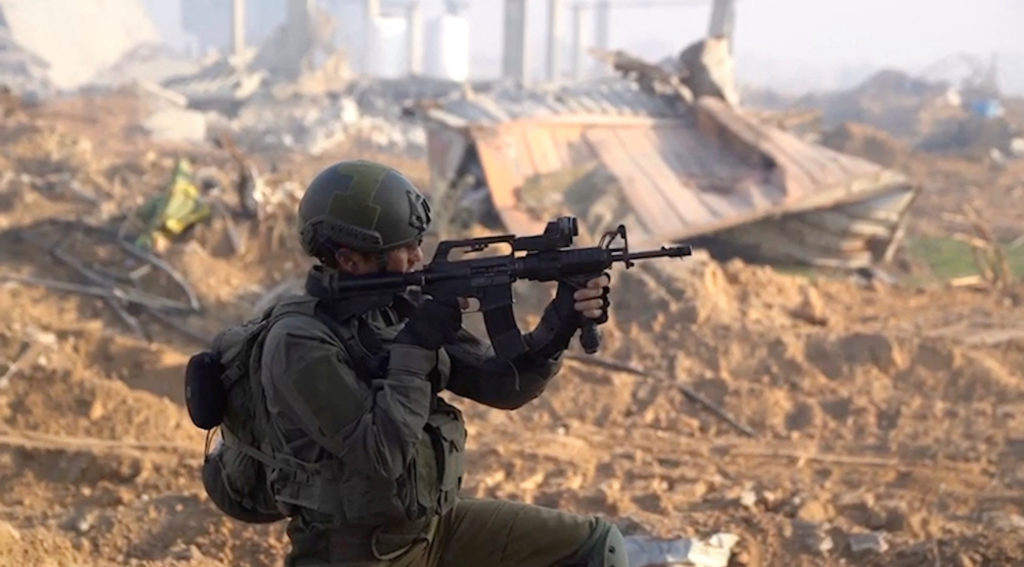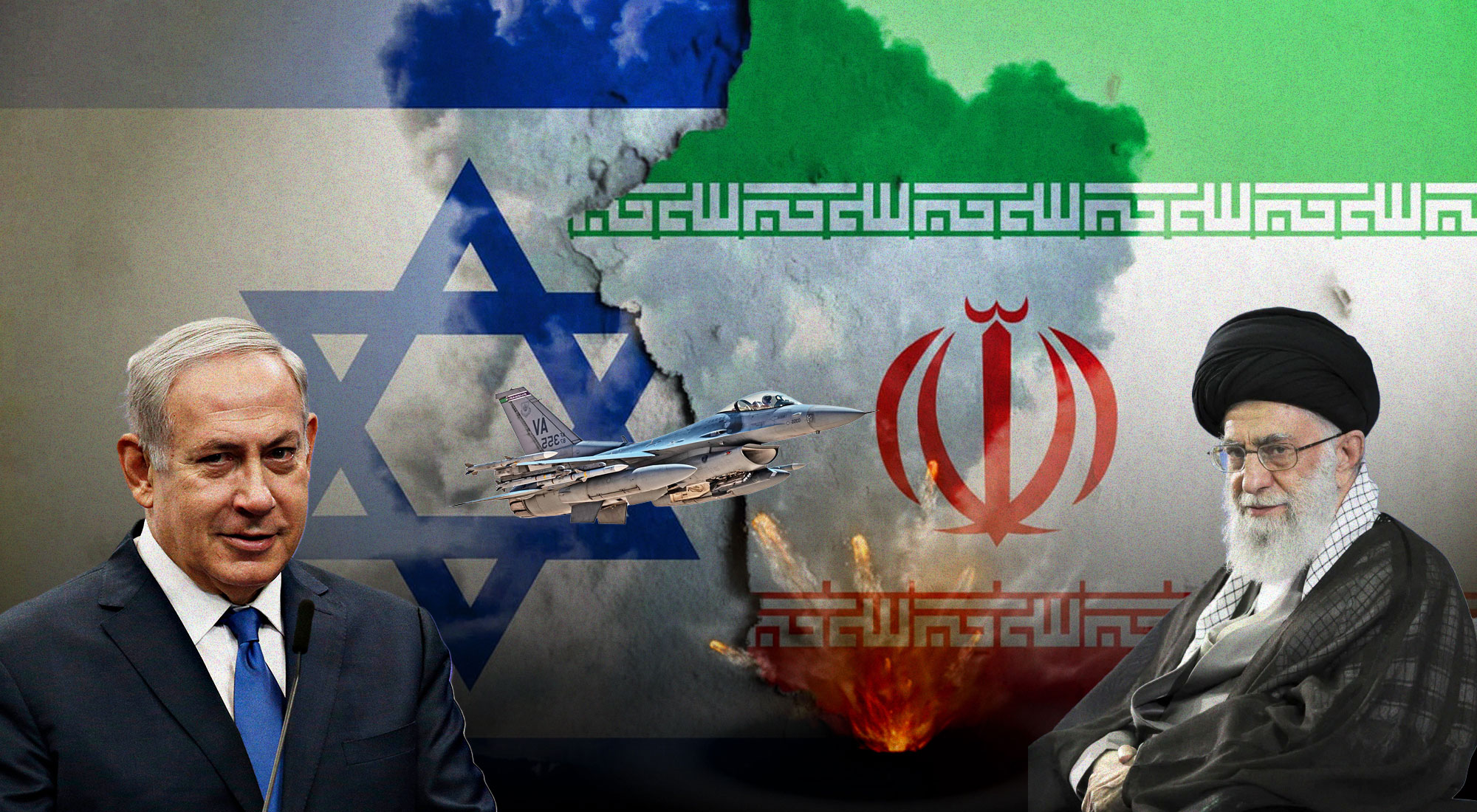war
Israeli strike at Gaza hospital kills Hamas official and aide

An Israeli air strike on a hospital in Gaza killed a senior Hamas leader and an aide on Sunday evening, a Hamas official told the BBC.
Ismail Barhoum, the head of the group’s financial affairs, was killed in the strike on Nasser Hospital, the main medical facility in Khan Younis.
He was receiving treatment at the hospital after being wounded in an air strike four days ago, the official said.
Israel’s military said it had struck a key Hamas member operating inside the hospital compound following “an extensive intelligence-gathering process” and said that “precise munitions” had been used to mitigate harm.
The Hamas-run health ministry said “many others”, including medical personnel, were injured.
The hospital department hit was evacuated after a large portion was destroyed, the ministry said.
Footage verified by the BBC showed people attempting to extinguish a fire after the strike.
Israel has repeatedly accused Hamas of using hospitals as hiding places for weapons and command centres, which the group denies.
Another Hamas leader, Salah al-Bardaweel, was killed by a separate Israeli air strike in Khan Younis on Sunday, an official told the BBC.
At least 30 people were killed in Khan Younis and Rafah as of Sunday morning, before the strike on the hospital in the evening, the health ministry said.
Israel resumed its military campaign in Gaza on 18 March, ending a ceasefire that lasted almost two months. Hundreds of people have been killed in strikes since then.
Israel blamed Hamas for rejecting a new US proposal to extend the truce. Hamas, in turn, accused Israel of abandoning the original deal agreed in January.
The war was triggered by Hamas’s attack on Israel on 7 October 2023, in which about 1,200 people, mainly civilians, were killed and 251 others taken hostage.
Israel responded to the 7 October attack with a military offensive in Gaza to destroy Hamas, which has killed more than 50,000 people, the Hamas-run health ministry said.
Taken From BBC News
war
Zelensky tells BBC Putin has started WW3 and must be stopped

Ukraine’s President Volodymyr Zelensky continues to send out a firm message of defiance.
When we met this weekend in the government headquarters in Kyiv, he said that far from losing, Ukraine would end the war victorious. He was firmly against paying the price for a ceasefire deal demanded by President Vladimir Putin, which is withdrawing from strategic ground that Russia has failed to capture despite sacrificing tens of thousands of soldiers.
Putin, Zelensky told me, has already started World War Three, and the only answer was intense military and economic pressure to force him to step back.
“I believe that Putin has already started it. The question is how much territory he will be able to seize and how to stop him… Russia wants to impose on the world a different way of life and change the lives people have chosen for themselves.”
What about Russia’s demand for Ukraine to hand over the 20% of the eastern region of Donetsk that it still holds – a line of towns Ukraine calls “fortress cities” – as well as more land in the southern regions of Kherson and Zaporizhzhia? Isn’t that, I asked, a reasonable request if it produces a ceasefire?
“I see this differently. I don’t look at it simply as land. I see it as abandonment – weakening our positions, abandoning hundreds of thousands of our people who live there. That is how I see it. And I am sure that this ‘withdrawal’ would divide our society.”
But isn’t it a good price to pay if that satisfies Putin? Do you think it would satisfy him?
“It would probably satisfy him for a while… he needs a pause… but once he recovers, our European partners say it could take three to five years. In my opinion, he could recover in no more than a couple of years. Where would he go next? We do not know, but that he would want to continue [the war] is a fact.”
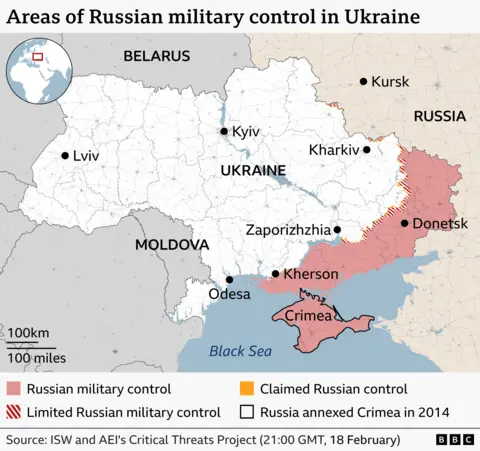
I met Zelensky in a conference room inside the heavily-guarded government enclave in a well-to-do corner of central Kyiv. In the interview he spoke mostly in Ukrainian.
You get a sense of the weight of leadership carried by Zelensky from the diligence of his security guards.
Visiting any head of state requires rigorous checks. But entering the presidential buildings in Kyiv takes the process to a level I have rarely experienced before.
It is not surprising in a country at war, with a president who has already been targeted by Russia.
Despite all that, the man who started as an entertainer, who won the Ukrainian version of Strictly Come Dancing in 2006, and played the role of an unexpected president of Ukraine in a TV comedy, before becoming the real-life president of Ukraine, seems to be remarkably resilient.
US President Donald Trump said on the eve of the most recent ceasefire talks in Geneva that “Ukraine better come to the table fast”.
He continues to default to putting more pressure on Ukraine than on Russia.
Western diplomats have indicated since last summer that Trump agrees with Putin that territorial concessions from Ukraine to Russia are the key to the ceasefire Trump wants, ideally before this coming summer.
Plenty of analysts outside the White House also judge that Ukraine cannot win the war and, without making concessions to Moscow, will lose it.
I asked Zelensky whether Trump and the others had a point.
“Where are you now?” Zelensky asked in return. “Today you are in Kyiv, you are in the capital of our homeland, you are in Ukraine. I am very grateful for this. Will we lose? Of course not, because we are fighting for Ukraine’s independence.”
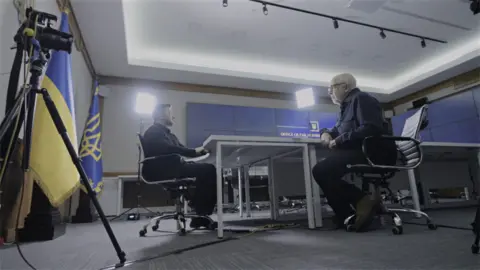
Zelensky has often said that Ukraine can win, but what would victory look like?
Of course, he said, victory meant restoring normal lives for Ukrainians and ending the killing. But the wider view of victory he presented was all about a global threat that he says comes from Putin.
“I believe that stopping Putin today and preventing him from occupying Ukraine is a victory for the whole world. Because Putin will not stop at Ukraine.”
You are not saying that victory is getting all the land back, are you?
“We’ll do it. That is absolutely clear. It is only a matter of time. To do it today would mean losing a huge number of people – millions of people – because the [Russian] army is large, and we understand the cost of such steps. You would not have enough people, you would be losing them. And what is land without people? Honestly, nothing.”
“And we also don’t have enough weapons. That depends not just on us, but on our partners. So as of now that’s not possible but returning to the just borders of 1991 [the year Ukraine declared its independence, precipitating the final collapse of the Soviet Union] without a doubt, is not only a victory, it’s justice. Ukraine’s victory is the preservation of our independence, and a victory of justice for the whole world is the return of all our lands.”
A year ago, Zelensky visited the White House and received a reception one senior Western diplomat described to me as a pre-planned public “diplomatic mugging” from Donald Trump and his Vice-President JD Vance.
Their argument, in the presence of the world’s media, was watched by millions around the world.
Trump, just inaugurated as president for the second time, was sending the strongest possible signal that the era of support Zelensky and Ukraine had relied on from President Joe Biden was over. Nato members were already on notice from the new administration. Vance had just got back from shattering Western European illusions about the strength of the trans-Atlantic alliance.
Since then, reportedly coached by Britain’s National Security Adviser Jonathan Powell among others, Zelensky has avoided public confrontations with Trump.
The US president has stopped almost all shipments of military aid to Ukraine. But the US still provides vital intelligence, and European countries are spending billions buying weapons from the Americans to give to Ukraine.

I asked Ukraine’s president about Trump’s often contradictory statements, recalling that among the untruths he has uttered is the accusation that Zelensky is a dictator who started the war – a precise echo of claims made by Vladimir Putin.
Zelensky laughed.
“I am not a dictator, and I didn’t start the war, that’s it.”
But can you trust Trump? If you extract a security guarantee from him, I asked, would he keep his word? He is after all a man who changes his mind.
“It is not only President Trump, we’re talking about America. We are all presidents for the appropriate terms. We want guarantees for 30 years for example. Political elites will change, leaders will change.”
He meant that US security guarantees needed approval from Congress in Washington DC to make them watertight.
“They will be voted on in Congress for a reason. It’s not just presidents. Congress is needed. Because the presidents change, but institutions stay.”
In other words, Donald Trump might be unreliable, but he will not be there for ever.
Zelensky says those security guarantees would have to be in place before he could consider another US demand – for Ukraine to hold a general election by the summer, echoing another Russian talking point that Zelensky is an illegitimate president. Trump has not demanded elections in Russia, where Putin became leader for the first time on the last day of the 20th Century.
Zelensky said he had not decided whether to stand again, whenever an election is held: “I might run and might not.”
Elections were due in 2024, but they could not be held under martial law that was introduced after Russia’s full-scale invasion.
Holding postponed elections, Zelensky said, was technically possible if they had time to change the law to allow them to happen. But he needed security guarantees for Ukraine first.
He went on to raise so many potential problems about holding an election with millions of Ukrainians abroad as refugees and significant tracts of the country occupied by Russia that I suggested that in reality he was against the idea.
“If this is a condition for ending the war, let’s do it. I said, ‘honestly, you constantly raise the issue of elections’. I told the partners, ‘you need to decide one thing: you want to get rid of me or you want to hold elections? If you want to hold elections, (even if you are not ready to tell me honestly even now), then hold these elections honestly. Hold them in a way that the Ukrainian people will recognise, first of all. And you yourself must recognise that these are legitimate elections’.”
war
Iran’s Strategic Victory Without a Battlefield

Paris (Imran Y. CHOUDHRY) :- Former Press Secretary to the President, Former Press Minister to the Embassy of Pakistan to France, Former MD, SRBC Mr. Qamar Bashir analysis : War is not always decided by the side that fires the first missile. Sometimes it is decided by the side that convinces its adversary that pulling the trigger would cost more than standing down. In the current standoff between the United States and Iran, this quieter form of victory is precisely what Tehran has achieved. Despite overwhelming American military superiority, despite aircraft carriers moving into the Arabian Sea, the Persian Gulf, and the Indian Ocean, and despite the familiar language of deterrence and coercion, Iran has so far prevented a direct U.S. attack. This outcome is not accidental, nor is it a product of fear or retreat on Iran’s part. It is the result of a calculated, multidimensional strategy that exploits global fatigue with war, fractures within Western alliances, domestic pressures inside the United States, and the irreversible shift toward a multipolar world.
If one were sitting in the Oval Office today, faced with the question of whether to strike Iran or step back, the decision would be far more complex than the raw military balance suggests. Iran is not Iraq in 2003, nor Libya in 2011. It is a large, populous, geographically fortified state with deep historical memory, layered alliances, and a proven capacity to absorb pressure while slowly turning it back on its adversaries.
From a purely military perspective, the United States could inflict serious damage on Iranian infrastructure. But timing matters. Any attack launched in the midst of an ongoing Gaza war would instantly fuse multiple theaters into a single regional confrontation. Hezbollah’s posture in Lebanon, Hamas’s survival despite months of bombardment, and the latent activation potential of Iraqi, Syrian, and Yemeni fronts mean escalation would not remain contained. A strike on Iran would not be a discrete operation; it would be a spark in a room filled with gas.
Target selection presents an even deeper dilemma. Hitting nuclear facilities risks regional environmental catastrophe and global economic shock. Targeting leadership would validate Iran’s long-standing narrative of external regime-change attempts and almost certainly unify the population rather than fracture it. Striking conventional military assets might satisfy tactical logic but would fail strategically, as Iran’s doctrine relies on dispersion, redundancy, and asymmetry rather than centralized command structures. In every scenario, the United States would be initiating a conflict whose second and third-order consequences are unknowable, but whose costs are guaranteed.
Economically, the calculus is equally unforgiving. Iran’s strength lies not in its economy but in its ability to disrupt the global economy. The Strait of Hormuz remains the world’s most sensitive energy chokepoint, and even limited instability there would send oil prices soaring. At a moment when global supply chains are already strained and inflation remains politically toxic in Western democracies, voluntarily triggering an energy shock would be an act of strategic self-harm. Europe, already grappling with immigration pressures, industrial decline, and political fragmentation, has made it clear it will not sign up for another Middle Eastern war that destabilizes markets and fuels domestic unrest. NATO’s reluctance is not ideological; it is existential.
The geopolitical environment further constrains Washington. China views Iran not as a client, but as a critical node in its energy security and Belt-and-Road connectivity. Russia, locked in its own confrontation with the West, has every incentive to see American attention and resources diverted. Neither power needs to intervene militarily to shape outcomes; their diplomatic backing and economic engagement alone raise the cost of American escalation. The Islamic world, meanwhile, is no longer passive. Iran’s framing of resistance, sovereignty, and selective engagement resonates across Muslim societies that see double standards in how nuclear weapons, occupation, and self-defense are judged.
Perhaps most underestimated is Iran’s mastery of narrative warfare. While Washington mobilizes fleets, Tehran mobilizes legitimacy. Iran’s leadership has projected calm, consistency, and defiance without theatrical bravado. There have been no panic signals, no evacuations, no visible fear. This composure matters. It signals confidence not only to allies but to adversaries, suggesting that Iran has already priced in escalation and prepared accordingly.
In contrast, the United States has struggled to manage its own information environment. The most sustained criticism of a potential war with Iran has not come from foreign governments but from within American society itself. Journalists, academics, activists, and digital influencers have shaped a narrative that questions priorities, hypocrisy, and moral credibility. Protests in cities like Minneapolis are not isolated events; they are symptoms of a deeper crisis of legitimacy. When citizens see naval armadas deployed abroad while domestic grievances remain unresolved, the contrast becomes politically explosive.
This internal pressure fundamentally alters presidential decision-making. Any move toward war would have to be justified not only to Congress and allies but to a skeptical public that remembers Iraq, Afghanistan, and Libya all too well. The optics of defending foreign demonstrators or foreign governments while struggling to reconcile divisions at home weaken the moral authority required for sustained military action.
Recent American actions elsewhere have only amplified this skepticism. Aggressive posturing toward Venezuela, including overt regime-change rhetoric and economic coercion, has drawn condemnation both internationally and domestically. Instead of reinforcing U.S. leadership, these actions have reinforced perceptions of overreach and selective application of international norms. Each such episode chips away at the credibility needed to rally support for another confrontation.
Against this backdrop, Iran’s refusal to accept externally imposed limits on its missile range or to hand over uranium stockpiles is not mere obstinacy; it is a defense of sovereign equality. The contrast with Israel, which possesses an undeclared nuclear arsenal outside international inspection regimes, is not lost on global audiences. The inconsistency in demands underscores Iran’s argument that the issue is not nonproliferation, but power hierarchy.
Iran’s internal resilience also matters. The Iranian political system was born from mass mobilization, not foreign installation. This history shapes both governance and resistance. The leadership understands that legitimacy flows inward, not outward. That same awareness explains why Iran has focused on endurance rather than provocation, on patience rather than panic.
If one were advising a U.S. president today, the pressures would converge toward restraint. Escalation risks regional war, economic shock, alliance fracture, and domestic backlash. De-escalation risks a perceived loss of face, but that loss is temporary and largely symbolic. War, by contrast, would be irreversible.
This is where Iran’s success becomes evident. By refusing to be baited, by maintaining strategic calm, by aligning itself with broader global trends toward multipolarity, and by allowing the contradictions of American power to surface on their own, Iran has so far won without firing a shot. The fleets can linger, statements can harden, but as long as the trigger is not pulled, the outcome speaks for itself.
In the end, power is not only the ability to destroy, but the ability to compel restraint in an adversary who possesses far greater destructive capacity. By that measure, Iran’s achievement is significant. It has transformed imminence into hesitation, pressure into paralysis, and threat into debate. For a superpower accustomed to dictating terms, hesitation itself becomes the story. And for a regional power long assumed to be on the defensive, survival without submission becomes a form of victory.
The greatest irony is that Iran’s success exposes a deeper truth about the current world order: brute force no longer guarantees compliance, and credibility cannot be enforced by aircraft carriers alone. In a world shaped by narrative, networks, and multipolar constraints, restraint can be the most powerful weapon of all.
war
How Iran Dismantled Mossad’s Hidden Network
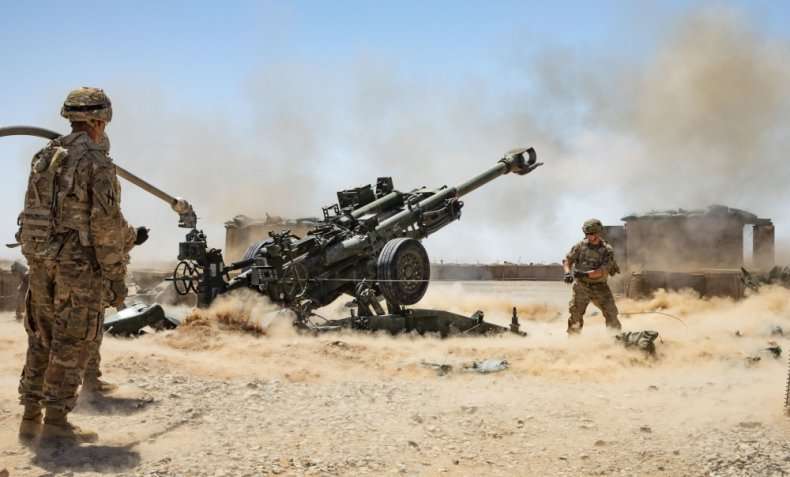
Paris (Imran Y. CHOUDHRY) :- Former Press Secretary to the President, Former Press Minister to the Embassy of Pakistan to France, Former MD, SRBC Mr. Qamar Bashir analysis : The confrontation that reshaped the intelligence and military balance in the Middle East unfolded between June 3 and June 15, 2025, when Israel and the United States launched a coordinated campaign against Iran that combined external strikes with what Tehran later described as a deeply embedded internal operation. It was not merely a clash of aircraft, missiles, and naval deployments. Iranian officials and regional analysts argued that it was a war prepared from within, built on years of covert penetration by Mossad, Israel’s world-renowned intelligence service. According to these accounts, networks of cultivated insiders had facilitated the smuggling of drones, communications equipment, and light weapons into Iranian territory.
The aftermath, now firmly in the past, triggered what Tehran called the largest counter-intelligence operation in its modern history, marked by mass arrests, the exposure of alleged cells, the seizure of weapons depots, and the dismantling of clandestine communication networks. By mid-June, the guns fell silent, but the intelligence war had merely shifted into a deeper and more complex phase.
That next phase began after the Davos meetings concluded on January 23, when President Donald Trump ordered the movement of a U.S. armada and flotilla of warships toward the Persian Gulf, positioning them to encircle Iran. The global media and defense circles immediately framed the deployment as the prelude to an imminent strike. Aircraft carriers, submarines, and long-range bombers dominated headlines. Markets trembled. Regional capitals braced. Yet, at the moment when an attack was most widely anticipated, it did not come.
Instead, Washington paused. According to defense analysts, this postponement was not hesitation, but calculation. The delay itself became a strategic instrument designed to induce nervousness and anxiety within Iran’s defense and political leadership, compelling them to move, displace, and conceal what they valued most—missile units, nuclear materials, command centers, and senior civilian, religious, and military figures.
As these movements unfolded, analysts argued, they created precisely what intelligence services seek: patterns. Satellites tracked convoys. Signals intelligence monitored encrypted communications. Human networks reported shifts in routines and locations.
In this reading, the attack was deliberately deferred so that Iran’s own efforts to protect its assets would expose them. Each relocation became a data point. Each new “safe place” became a coordinate. When the moment came, these analysts claimed, targets would already be locked—ready for B-2 bombers, F-35 squadrons, or Tomahawk missiles launched from submarines hundreds of miles away.
Tehran, however, rejected the notion that it was merely a subject of this strategic chess game. Iranian officials emphasized that, in the wake of June and throughout the tense weeks that followed the January naval deployment, the country had dramatically expanded its counter-intelligence posture. With technical and advisory support from Russia and China, Iran claimed to have shifted its focus beyond human networks to the digital and satellite-based systems allegedly used to coordinate covert activity and unrest inside the country.
One of the most striking claims to emerge from this period involved the discovery of large numbers of Starlinked satellite based communication devices, often described in regional reporting as “starlink kits.” These systems were designed to bypass Iran’s domestic telecommunications infrastructure and link operatives directly to external command centers. Through these channels, real-time instructions could be transmitted—where to assemble, which facilities to target, how to provoke security forces, and how to frame events for international audiences once clashes occurred.
The method, as it was later described, followed a tightly engineered pattern. Small groups would initiate acts of vandalism or violence in public spaces. When security forces intervened, they would be fired at by sophisticated automatic weapons to trigger confrontations. Images and reports of these clashes would then be rapidly amplified across global media platforms as evidence of state repression. The objective was not simply to destabilize Iran internally, but to construct a moral and political narrative that could justify renewed external pressure or even direct military action.
Iranian authorities claimed that, working with Russian and Chinese technical expertise, they eventually traced the signal pathways behind these systems. Uplinks and downlinks were identified. Devices were seized. The digital bridge between alleged external coordinators and internal operatives was disrupted. As a result, Tehran argued, the momentum of street-level unrest declined, and the information battlefield tilted back in favor of the state.
Overlaying these tactical maneuvers was a deeper ideological framing articulated by Iran’s leadership. In speeches delivered by the country’s supreme authority portrayed the confrontation not merely as a geopolitical struggle, but as a test of spiritual endurance. When the world turns against the Muslim community, he told followers, divine support alone is sufficient. This religious narrative provided a form of resilience that could not be neutralized by satellites, sanctions, or surveillance.
At the strategic level, another current shaped Western and regional calculations: Iran’s steadily advancing missile and nuclear capabilities, whether acknowledged, denied, or deliberately left ambiguous. The June 2025 exchange also exposed the limits of Israel’s and America’s ability to achieve decisive results without risking serious retaliation.
Iran was not an isolated state on the periphery of global politics. It stood at the intersection of major power interests. Russia and China openly opposed a war that could redraw the strategic map of the region. Turkey publicly accused Israel of pushing the United States toward a conflict that would destabilize the entire Middle East. Within NATO, enthusiasm for opening another major front appeared limited.
Meanwhile, Washington faced pressures far beyond the Persian Gulf. From the Caribbean to South America, shifting alliances and growing resistance to U.S. influence demanded diplomatic and strategic attention. The prospect of managing simultaneous crises across multiple theaters introduced caution into decision-making circles, as military assets and political capital were stretched across competing priorities.
Hovering over all these calculations was the narrow corridor of the Strait of Hormuz. Any disruption there would send shockwaves through global energy markets and supply chains, with consequences reaching far beyond the region.
Iran’s post-June and post-January campaign to loosen Mossad’s alleged grip—through mass arrests, technological countermeasures, and strategic partnerships—which signaled Iran’s determination to contest every layer of the intelligence battlefield, from the streets of its cities to the orbits above its skies.
The United Nations, often dismissed as powerless, remained, in principle, the only forum capable of conferring collective legitimacy on any lasting settlement. Its strength lay not in its bureaucracy, but in the willingness of member states to honor its resolutions and arbitration. If that willingness continued to erode, the world risked sliding from a rules-based order into a raw contest of power.
For now, June’s firestorm belonged to history, and January’s naval chessboard defined the present. Beneath the visible movements of fleets and leaders, the silent war of spies, signals, and counter-signals continued to shape the future—reminding the world that in the modern age, the most decisive battles are often fought far from the front lines, in the hidden spaces between information, perception, and power.
-

 Europe News12 months ago
Europe News12 months agoChaos and unproven theories surround Tates’ release from Romania
-

 American News12 months ago
American News12 months agoTrump Expels Zelensky from the White House
-

 American News12 months ago
American News12 months agoTrump expands exemptions from Canada and Mexico tariffs
-

 American News12 months ago
American News12 months agoZelensky bruised but upbeat after diplomatic whirlwind
-

 Art & Culture12 months ago
Art & Culture12 months agoThe Indian film showing the bride’s ‘humiliation’ in arranged marriage
-

 Pakistan News8 months ago
Pakistan News8 months agoComprehensive Analysis Report-The Faranian National Conference on Maritime Affairs-By Kashif Firaz Ahmed
-

 Art & Culture12 months ago
Art & Culture12 months agoInternational Agriculture Exhibition held in Paris
-

 Politics12 months ago
Politics12 months agoUS cuts send South Africa’s HIV treatment ‘off a cliff’







